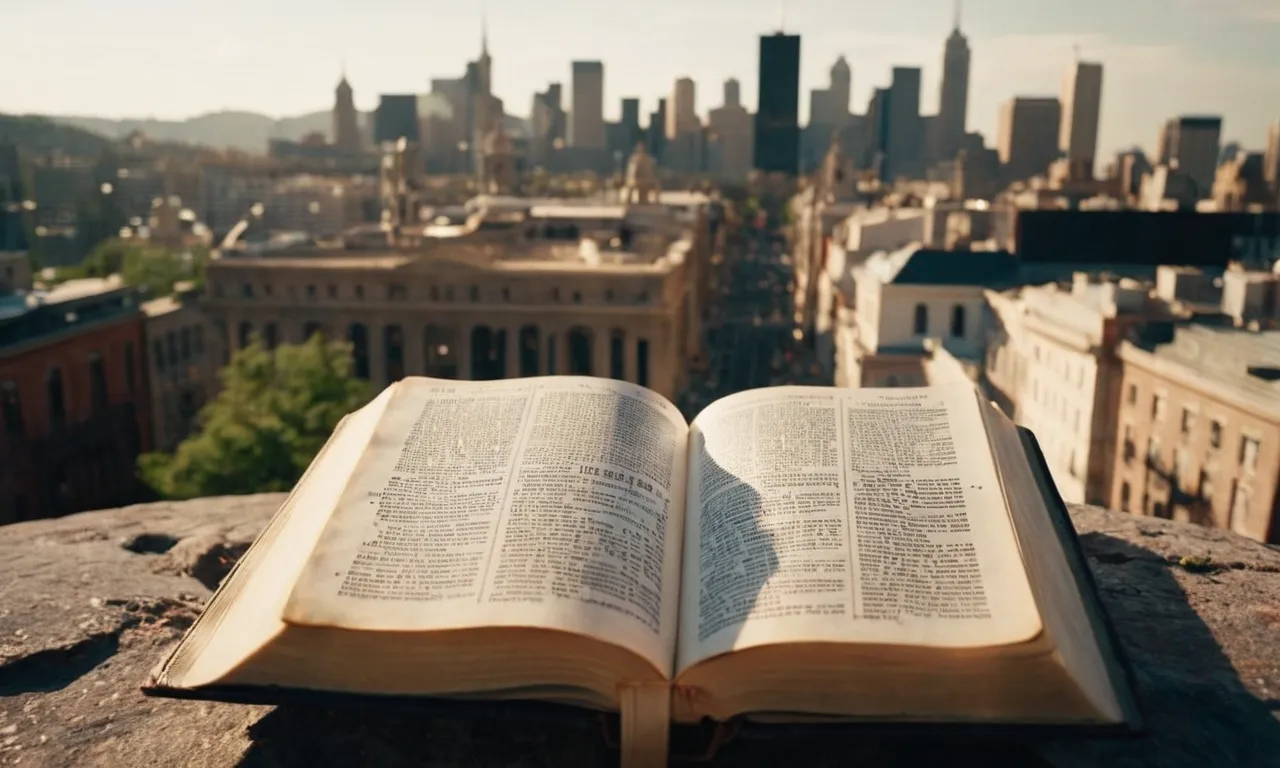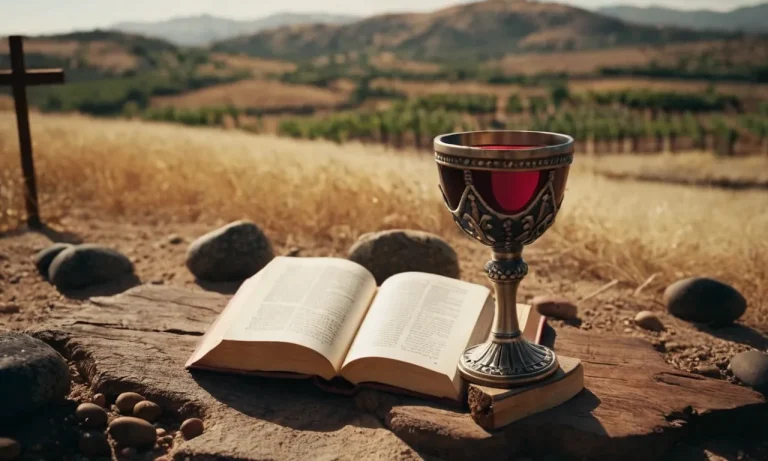What Does The Bible Say About Chaos?
Chaos and confusion can feel overwhelming in our lives. When everything seems out of control, we wonder if God has abandoned us. However, the Bible offers hope and reassurance, even in tumultuous times.
If you’re short on time, here’s a quick answer to your question: The Bible says God is a God of order, not disorder. Though we may experience chaos, God promises to be with us and sustain us when life feels out of control.
In this article, we’ll explore several Bible passages that speak to the issue of chaos and confusion. We’ll look at how God promises order and provides refuge in chaotic times. With over 150 verses related to disorder and upheaval, the Bible offers rich wisdom for finding peace when everything seems chaotic.
God Creates Order Out of Chaos
The creation story in Genesis 1 shows God’s power to bring order out of chaos. In the beginning, the earth was “formless and empty” (Genesis 1:2), but God brought structure by separating light from darkness, sky from sea, and land from water.
He filled this ordered world with plants, animals, and humans. Theologians see this account as evidence that God creates an orderly, purposeful world rather than leaving creation to chance. As John Calvin wrote, “God by the power of his Word and Spirit createth heaven and earth, and all things in them, out of nothing, forming them so as it seemed good unto him.”
The Creation Story Shows God’s Power Over Disorder
The opening verses of Genesis describe a chaotic void prior to God’s creative acts: “Now the earth was formless and empty, darkness was over the surface of the deep” (Genesis 1:2). This primordial state of darkness and emptiness contrasts with the ordered universe God forms.
By speaking light, sky, land, plants, animals, and humans into being, God demonstrates supreme authority over the chaos. Even the great sea monsters (Genesis 1:21) obey God’s command to fill the waters.
Theologian Dietrich Bonhoeffer thus saw Genesis 1 as a direct refutation of ancient Near Eastern creation myths in which gods battled chaos. Instead, the biblical God effortlessly overpowers disorder and fills the void with purposeful design.
God Continues to Rule Amidst Worldly Chaos
While God created an ordered world, sin later introduced pain, conflict, and death into human existence (Genesis 3). Humans still experience chaos in the form of natural disasters, disease, wars, and interpersonal strife. But biblical authors repeatedly affirm God’s sovereignty over worldly turmoil.
The Psalms praise God’s kingship over raging seas (Psalm 89:9) and say the whole earth should tremble at His presence (Psalm 114:7). Jesus calmed storms (Mark 4:39) to reveal God’s authority over nature’s chaos.
Paul wrote that all powers and authorities were created by and for Jesus Christ (Colossians 1:16). Revelation pictures history moving toward God’s final triumph over evil (Revelation 20-22). Despite the fallen world’s continuing disorder, Scripture declares the orderly rule of the Creator who will one day fully restore the harmony of His kingdom.
Putting Trust in God’s Sovereignty Over Chaotic Times
Psalms for Finding Refuge from Chaos
The Book of Psalms contains many passages that encourage trusting in God during turbulent times. Psalm 46 famously declares, “God is our refuge and strength, an ever-present help in trouble” (Ps. 46:1).
Psalm 23 depicts God as a caring shepherd who leads His people through “the valley of the shadow of death” (Ps. 23:4). Psalm 91 promises that those who dwell in the shelter of the Most High will find rest in the shadow of the Almighty amid pestilence, peril and warfare (Ps. 91:1-7).
These and other psalms reassure believers that God remains sovereign and a stronghold for those who put their trust in Him, even when their world seems to be falling apart.
In addition to proclaiming God’s sovereignty, many psalms are honest about the raw human emotions that arise during chaotic times – fear, anguish, confusion – and bring them before God in vulnerable prayer. Psalms 13, 42 and 43 contain laments crying out to God in distress.
Psalms 77 and 88 honestly grapple with feeling abandoned by God in suffering. Through prayerful lament, the psalmists find reassurance of God’s steadfast love and redemption. As one scholar notes, the psalms “provide models of prayer that embrace lament, pain, and confusion as ways of continuing a conversation with God” amidst chaos.1
New Testament Passages on God’s Control
In the New Testament, Jesus repeatedly encourages His followers not to worry amidst life’s turbulence because God reigns supreme. In Matthew 6, Jesus points to God’s care for the birds and flowers as evidence that He will also care for His children even in hard times.
Jesus ends this teaching by instructing, “do not worry about tomorrow, for tomorrow will worry about itself. Each day has enough trouble of its own” (Matt. 6:34). This exhortation to stay focused on today’s troubles instead of being consumed with fear of what may come provides perspective for chaotic times.
The Book of Revelation depicts God’s sovereignty amidst cataclysmic events on earth. John’s visions reveal that even massive upheaval among nations “will happen when God decides to make it happen” (Rev. 11:18).
God remains on the throne directing history according to His perfect plan and purpose, even allowing a time of terrible tribulation before ushering in His eternal Kingdom (Rev. 1:8, 22:13).
The writings of Paul also emphasize God’s complete control over every earthly authority. He describes God as the one “who accomplishes all things according to the counsel of His will” (Eph. 1:11). Paul encourages believers that no rulers, angels, demons or powers can thwart God’s sovereign plan, reassuring that “in all things God works for the good of those who love Him” (Rom.
8:28).2
Receiving God’s Perfect Peace in Confusing Times
Let Not Your Heart Be Troubled
In confusing and chaotic times, it can be easy to feel anxious, afraid, and overwhelmed. However, as Christians, we can receive God’s perfect peace if we trust in Him. The Bible reminds us, “Do not let your hearts be troubled. You believe in God; believe also in me” (John 14:1).
Though turmoil surrounds us, we can experience calmness on the inside when we fix our eyes on Jesus.
God’s peace surpasses human understanding and logic (Philippians 4:7). It guards our hearts and minds when nothing makes sense. We access this supernatural peace by praying, reading Scripture, worshipping, and staying connected to God.
He is always speaking peace over our circumstances if we tune our ears to hear Him.
The Bible is filled with verses about finding refuge in the Lord when facing trials. “You will keep in perfect peace those whose minds are steadfast, because they trust in you” (Isaiah 26:3). By trusting in God’s sovereignty rather than our own strength, we can experience serenity amid the storm.
God’s Peace Surpasses Understanding
Human wisdom cannot fathom God’s calming presence in difficult times. But those who fix their thoughts on Him can personally experience peace that defies circumstance. “And the peace of God, which transcends all understanding, will guard your hearts and your minds in Christ Jesus” (Philippians 4:7).
This supernatural peace comes from being in relationship with the Prince of Peace. Jesus said, “Peace I leave with you; my peace I give you. I do not give to you as the world gives. Do not let your hearts be troubled and do not be afraid” (John 14:27).
Because of Christ’s finished work on the cross, we can be reconciled to God and no longer be enemies with Him. We can rest in His love and find refuge in Him always.
We may not be able to control external chaos, but we can control where we turn for peace. “You will keep him in perfect peace, whose mind is stayed on You, because he trusts in You” (Isaiah 26:3 NKJV).
By fixing our eyes on the Lord through prayer and studying the Bible, we can experience stability in unstable times. Rather than trying to figure everything out, we can find rest in God’s perfect peace that surpasses human understanding.
Standing Firm in Faith Despite Surrounding Disorder
Daniel: Faithfulness in Exile
As described in the Old Testament book bearing his name, Daniel was a young man of strong faith who was exiled to Babylon yet remained obedient to God despite pressure to conform. When King Nebuchadnezzar besieged Jerusalem, Daniel was taken captive and sent into exile around 605 B.C.
However, Daniel “resolved not to defile himself” by eating impure foods or worshipping Babylonian gods (Daniel 1:8). Although he faced death for disobeying the king, Daniel’s faith gave him courage. As a result, God gave him favor with his captors while exile lasted around 70 years.
Daniel served as an administrator under several Babylonian and Persian rulers. He gained renown as an interpreter of dreams and receiver of prophecies, crediting his wisdom to the God of Israel. For instance, Daniel interpreted King Nebuchadnezzar’s dream of a towering statue, predicting the succession of kingdoms that later occurred (Daniel 2).
Though jealous schemers got Daniel thrown into a lions’ den, God rescued him, and his accusers were executed (Daniel 6). Through Daniel’s story, the Bible encourages readers to have integrity like he did even when pressured to compromise.
Shadrach, Meshach and Abednego: Trust Amid the Flames
Three young Israelite exiles named Shadrach, Meshach and Abednego also feature in the Book of Daniel. As administrators in King Nebuchadnezzar’s service, they faced pressure to worship a gold statue of the king. However, they resolutely trusted God and refused since that would break His commandments.
| Shadrach | Meshach | Abednego | |
|---|---|---|---|
| Status | Administrator | Administrator | Administrator |
| Faced | Death for not worshipping idol | ||
| Response | Stood firm in faith, trusted God to save | ||
| Outcome | Rescued from fire, gained king’s favor | ||
As this story shows, God honors those who honor Him even under intense pressure. The three men inspiringly trusted God rather than compromise or cave in to fear. Their courage remains an “example of faithfulness and commitment to moral purity” today (gotquestions.org).
Waiting Patiently for God to Establish Order
When facing chaos and disorder in life, the Bible advises us to wait patiently for God to restore stability in His perfect timing. Two books that offer wisdom on this are Ecclesiastes and 2 Peter.
Ecclesiastes: There is a Season for Everything
The author of Ecclesiastes reminds us that there is an appointed season and time for every endeavor under heaven (Ecclesiastes 3:1). There are times of building up and tearing down, times of weeping and laughter, times of war and peace. Disorder and upheaval are part of the natural cycles of life.
Rather than despair, we can find encouragement in knowing there is also a season for healing and reconciliation. As Ecclesiastes 3:11 (NIV) says, God “has made everything beautiful in its time. He has also set eternity in the human heart.” Deep down, we long for order and justice to be established.
2 Peter 3: God’s Promised New Heavens and New Earth
The apostle Peter also points to God’s promise of eventually setting all things right. He writes of scoffers who made fun of the idea that Jesus would return, saying things have remained unchanged since creation (2 Peter 3:3-4).
Peter responds that the delay is actually an expression of God’s patience towards us, not wanting anyone to perish (v.9).
And the day of the Lord’s return will come unexpectedly, Peter warns! On that day, the present heavens and earth will be dissolved and give way to “new heavens and a new earth, where righteousness dwells” (v.13). Righteousness and justice will reign fully and eternally.
So amidst the ups and downs of life, we wait patiently for God’s new and perfect order to come. We also play our small part in sharing God’s love and light to make this world a little better in the meantime.
Conclusion
Chaos has been part of the human story since Genesis, but God’s sovereignty and goodness remain steadfast. By turning to Scriptures that reinforce God’s faithfulness, we can anchor our hearts in hope during confusing seasons.
Though disorder surrounds us, we can trust the One who hovered over chaos at creation and spoke light into existence. He promises to be our refuge and strength during life’s storms. When we fix our eyes on eternity, we can wait patiently for the day when God makes all things new and order prevails.







